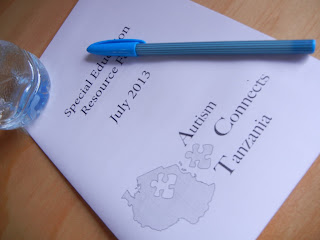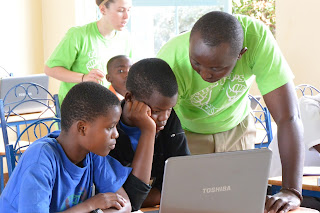Perhaps the most
cost-effective way that EdPowerment affects positive change in society at large
are the workshops organized by our initiative, Autism Connects Tanzania
(ACT). Each summer we take advantage of
the fact that Kerri Elliott and Jillian Swinford, two special education
educators from the Chicago area, spend their school “vacations” in the Moshi
area, planning some of these events with our Country Director, Grace Lyimo.
Last Saturday ACT held its annual Resource Fair, a unique and invaluable opportunity for the
diverse organizations that serve special needs individuals to come together and share. These connections allow social service,
educational and medical professionals to leverage their outreach to disabled
individuals, their guardians and the community.
Saturday’s start was a
little shaky as rains delayed participants.
In this region rains immediately compromise the dirt roads, complicating
transportation. By 10:30, however, the
Fair commenced with 24 attendees from Arusha, 44 from Moshi, two from Boma and
one from Imani Vocational in TPC – 71 individuals dedicated to forging ways to
help the disabled in a society marked by crushing stigmas and ignorance.
The meeting’s topics
included:
- Identifying appropriate children for services.
- Narrowing an organization’s mission in order to better reach its target group. Each organization presented its mission, sharing the difficulties of networking in order to uncover its intended population.
- Building a Caring Community (BCC), Moshi, shared its approaches to staff development, as did Comprehensive Community Based Rehabilitation in Tanzania (CCBRT). Even through BCC is one of the larger organizations working with special needs children in the area, many attendees did not know about it and asked many questions, opening up strategic connections for all.
- Lunch: Here participants were told everyone to sit with people they did not know in order to exchange ideas. Tables also had been set up for the organizations to display their brochures/items.
A last minute speaker cancellation sprung Kerri
and Jillian into action to talk about types of funding options. Representatives of various groups shared how they have
received funding and the pros and cons of that type of funding. This was
one of the most popular sessions as people asked questions, took copious
notes, and called for further workshops on this challenge.
In just four years ACT has
become a respected change agent for the humane treatment of disabled individuals
in Tanzania.



































